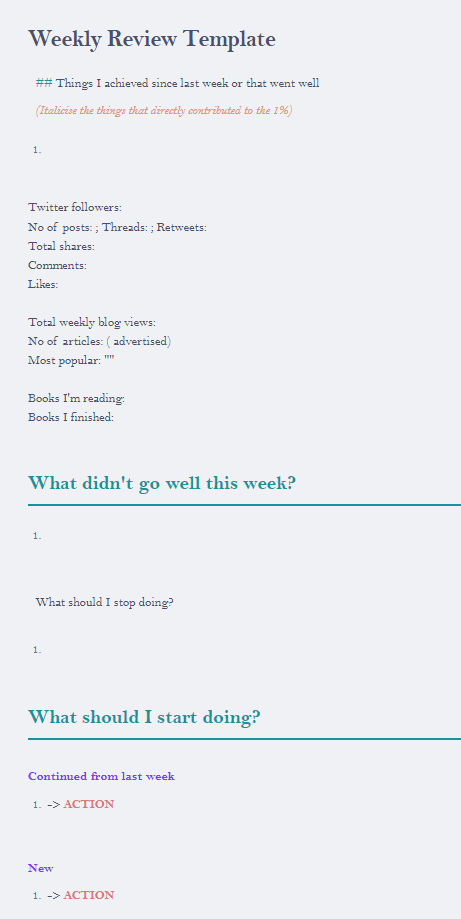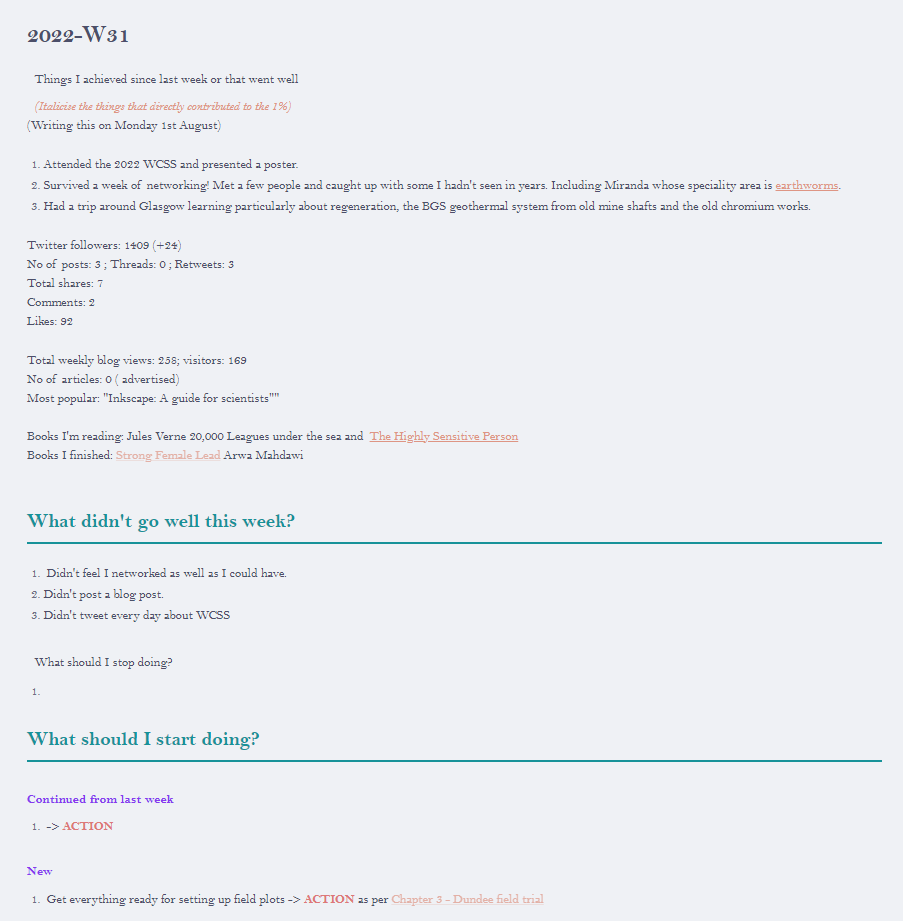Table of Contents
When I started writing the title I immediately thought that it would turn many people away, but I used it anyway. Who would actually 'love doing' a 'personal weekly review'? It's like unneeded bureaucracy in your life. But hear me out and hopefully by the end, you'll want to try it out too.
A brief overview
I've been doing weekly personal reviews since the middle of June. Now they can take different forms for different people but the idea is that it helps you keep focused on your work and/or personal aspirations. It could be where you set out your calendar for the week, or the goals over the next 7 days and/or a list of gratitudes. A weekly review is, however, also designed to look backwards as well as forwards. Other than that, the scope of it, is pretty much up to you.
It can be as simple or as complex as you like. And boy do a lot of people seem to make it complicated.
Where did the idea of a Weekly Review come from?
I was first exposed to the idea of a personal review by Mike Schmitz, during a live webinar called "Gaining Clarity with an Obsidian Retreat". If you missed it, it was part of the "Linking Your Thinking" 2022 conference by Nick Milo, the whole series of which is definitely worth a watch in your downtime if you're suffering from information overload like me... He does a quarterly review, where he takes himself off somewhere nice and reflects on the past 3 months and the next 3 months.
The idea around my starting one also came from "The 12 Week Year" by Brian P. Moran and Michael Lennington (I briefly reviewed this in my June 2022 Book Club for One). They advocate weekly reviews (both personally and reflecting as a group) to keep on track with their 12 week year approach to business targets. This approach can also have metrics applied to it. And furthermore, because these are designed to be done within the work day, they are time efficient.
These two approaches made the idea seem friendly and useful. Basing it around these approaches were fine for me. But I wouldn't be writing a researched article if I didn't Google what others did.
Although I haven't read it, the book "Getting Things Done" by David Allen, I think pioneered the idea of a weekly review; this todoist guide makes this method sound so complicated and difficult though. People like Tiago Forte also take similar, more complex approaches which include making sure all your inboxes are cleared out and that your desktop is tidy. These are all well and good but really extend into scheduling, keeping things tidy and organisation rather than 'a review'.
So these weren't such good approaches for me.
But that's my opinion of course. As far as I'm concerned I need something to orientate my week, not plan it to the nth degree like most weekly reviews seem to advocate. I wanted something a bit more streamlined. So I've combined components of these ideas to get something a little more personal, shorter, easier and well, more likely that I will do it.
What actually is a personal 'Weekly Review'?
The weekly review for me, is about showing up and taking responsibility for my actions.
Ultimately the personal weekly review, is a weekly process to identify how what you have done in the past, can help navigate you into the future. It should be written down, either digitally or physically. To give it an ecological term it's a roadmap to find and fit into your niche. That unique blend of 'you-ne-sais-pas'. But finding your niche requires understanding what works and what doesn't. We'll call that bit, evolution. And a weekly review roadmap helps to do just that; evolve yourself to fit the niche you've identified.
This is of course my opinion and others may disagree, which is likely dependent on the personal method you choose.
Consider others' approaches to help create what you need, then make your own
There were two things that struck me the most about Mike Schmitz's process. His is the most 'wholesome' I have found.
The first was considering what you should stop doing. It might seem weird, but I didn't know there was an option for stopping doing stuff!! And making a clear conscious decision about it too. Not a, 'I should stop doing this', but more of a, 'if I don't stop doing this then I can't achieve the rest of the things I've set out to do'. It might seem small, but having a section of a weekly review that says, 'Things I will stop doing' I find incredibly helpful.
The other thing he said was to "lean into your unique abilities". I love this. It's like use all the things that make you, you, to help rather than hinder your progress. It's a process of identifying the things that no-one else can do, or maybe I would clarify and say that it's the unique blend of things that no-one else can (or currently) do. I mean, who loves getting up at 5am, to write weekly blog posts on plant and soil science and PhD stuff and random life stuff? Who else loves shouting into a void for six months until a Google bot starts acknowledging they exist? Not. Many. People. Well, love might not always be the right word, but you get the picture. It builds into this idea of your niche.
Here's a list of some other people's weekly review styles, including those I mentioned above, in case you're wanting to create your own method:
- Tiago Forte
- todoist based on the "Getting Things Done" approach
- Ali Abdaal has a completely no-nonsense approach to the Weekly Review
- Marla Cummins has written this approach for those with ADHD
- Nicole van der Hoeven uses a nice Obsidian setup for her reviews
- Or if you want super simple, follow this Plus Minus Next approach from Anne-Laure Le Cunff at Ness Labs
Here's an example of what my review looks like
My weekly review is focused around my sub-goals of my main goal. At the moment this is; 'finish my PhD to a standard where I can get a related job afterwards'. Yes, sorry, I'm sad enough to have 'sub-goals'!! I'm going to stick in a quote from James Clear because he says it better than me and makes it sound less bureaucratic as to why I do this!
You do not rise to the level of your goals. You fall to the level of your systems.James Clear, Atomic Habits
So my planning system is all there, but we'll talk about execution another time ...!

This is my template for my weekly review. Tracking Twitter and website stats helps me keep on track of how well my blog is doing. Screenshot by Annette Raffan.
Anyway, as an example, one of my sub-goals is to post 100 PhD-linked blog articles by the time I finish my PhD. Do the math from when I set this and it works out about one post every 2-ish weeks. This is not the crap about my favourite recipes, this is the juicy stuff, like: How to use Inkscape to draw scientific diagrams. And do you know how long these take to write? Jesus, its a full time job!!
Therefore each week I look at my website and Twitter metrics and how much writing I've done to help keep up the pace. Did I post an article this week? If yes, did this article resonate with people if I posted it on Twitter? If not, have I got one in the pipeline for next week? I mean to a large part this works for me... as I write this frantically on Thursday and Friday morning at 5.30am to get it out for Friday morning at about 9am ... learn to write faster; tick! All in all, this essentially uses the metrics approach highlighted in The 12 Week Year.
I also like to highlight the things that went well that directly contribute to the 1%. If you've read James Clear's Atomic Habits you'll know what this is; it's the things that keep you moving forwards to your goals.
I don't always write things in every section, but I do try to. I put my 2-4 priorities in the 'What should I start doing?" section. The most important bit in this is the 'ACTION' where I define how I will achieve what I need to do.

What is not a 'Weekly Review'?
I wrote this title while I was outlining this post thinking that I would write what a weekly review wasn't. But on reflection, it's not for me to say what you should and shouldn't include!! Nor how much time, nor the form it should take. The one thing I would say, is that make sure it's personal to you; not what somebody else wants or thinks, but you. But the reality is that if you do it at work, as I do (though it's often at 'lunchtime') then work goals will be a part of it.
For me personally, I don't want it to be a rant. It needs to be succinct. After all, it needs to be done within 20-30 minutes. It also needs to be useful, so I don't have gratitudes, but this may change. Writing a list of more than five things to prioritise over the next week is not helpful, because by the next week many will still be there = fail = disappointment = give up.
Why is reviewing what you've done over the last week useful?
Put simply, looking back on your past can help frame your future and reflect more objectively on your former actions. I'm going to stick in another quote here from the book "Personality isn't Permanent" because that's all that needs to be said.
Every time you face your past, you change it. Every time you face your future with honesty and courage, you become more flexible and mature.Benjamin P. Hardy
How to design your own weekly personal review
Although your personal weekly review may evolve over time, I would try to stick to a defined template each week. Think about what is most important to you and design it around this. Probably, keep it simple? There will be weeks when time is not on your side. Keep the desire for writing vast reflective essays for when you have the opportunity, or a blog...
Get into a routine of when you do it. Go somewhere nice and relaxing. Keep it consistent, but don't be afraid to make changes as to what works for you; try things out!
Well done for making it to the end!
As usual, this post has morphed into something much longer than originally anticipated. However, I hope that you've found this insight into my Weekly Review process useful. I'd love to know if you do one and how you go about it.









Comments